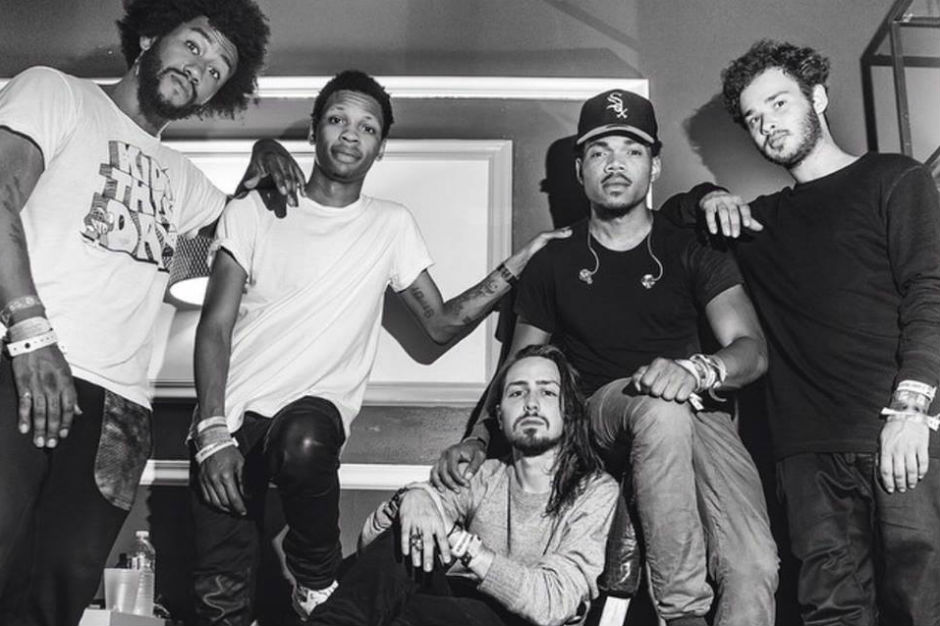Release Date: May 31, 2015
Label: Self-Released
He tried to tell us, but we wouldn’t listen. Despite his repeated insistence to the contrary, many fans of Chance the Rapper‘s first two mixtapes — 2012’s #10Day and (particularly) 2013’s mainstream breakthrough Acid Rap — wanted to believe that imminent “surprise” LP Surf was actually going to be the third proper Chance release. When the album finally (and sneakily) dropped last Thursday night, it was reported almost across-the-board (including in this publication) as the new Chance the Rapper album, or at best the new “Chance the Rapper & the Social Experiment” album, as if the group was some Wings-like backing band that could essentially be employed or discarded at the artist’s discretion, with little relevance to the listening public.
But no: As the man born Chancelor Bennett attempted to explain to us all along, this is very much a Social Experiment album, and while the outfit does have a leading man, he isn’t it — that role belongs to Donnie Trumpet, a.k.a. 21-year-old Nico Segal, the baby-faced horn-blower who engineered much of the group’s earliest work. (“He was working on [Surf] when we decided to be The Social Experiment,” Chance explained to Fader earlier this year. “So we decided that his project should be first.”) And after something of a fakeout beginning — the rapper weighs heavily on intro cut “Miracle,” and second song “Slip Slide” begins with a boisterous Busta Rhymes specifically thanking Chance (and no one else) for letting him guest on the album — Donnie is in fact revealed to be a far more consistent, overarching presence on the album than the Social Experiment’s star vocalist, who only appears on about half the tracks, goes absent for entire sections of the LP, and refuses to domineer the songs he’s on.
https://youtube.com/watch?v=QuMEA6Od420
It’s a strange approach for a rapper as ascendant as Chance — who’s showed greater potential to approach Kanye West in popularity and importance than any other figure in post-College Dropout Chicago hip-hop — to suddenly sublimate himself to supporting-actor status. But the rapper has always shown an ambivalence towards fame and success, often nearing the point of self-contradiction. He wants to make his music reach as many people as possible, but he’s never put out an official single. He’s fiercely independent, but he’s appeared on songs by Madonna and Justin Bieber. He loves leading audience singalongs at his shows, but he hates playing his most popular songs. He’s a workaholic and studio rat — “Take a break when I break my leg,” he raps on Surf‘s “Rememory” — but technically speaking, he’s yet to even release his debut LP. He’s obviously ambitious, but he seems frightened by the lack of control that success brings, the chance that his message will be diluted or misappropriated or otherwise sullied by overexposure.
Viewed through that lens, it makes sense that Chance would go with more of a strength-in-numbers approach with the Social Experiment. Surf allows him to stretch out creatively and have fun making music with his hometown friends, without the pressure of making a direct Acid Rap follow-up or the responsibility of having to represent for anything larger than himself — his city, his generation, maybe all of hip-hop — on his own. And Chance does seem somewhat liberated by the possibilities: His rapping is more limber than ever on double-time workouts like “Rememory” and “Miracle,” where he sounds almost like he’s going for Twista’s local stopwatch-breaking records. If possible, though, he sounds happiest on the tracks where he’s not present at all, more than content to cede into the background and let his buds shoulder the load.
And so what is Surf, if pointedly not a Chance the Rapper album? Well, its sound certainly won’t be alien to anyone who’s followed Chance since his star-burst — four of producer/bandmate Nate Fox’s beats ended up on Acid Rap (including the MC’s biggest “hit,” the rollicking “Juice”), and the backing quartet has followed their leader to live gigs for the past few years. And for true devotees of the Chicago underground, the group might already be familiar for its relation to Kids These Days, a now-defunct hybrid collective — fronted, coincidentally enough, by Vic Mensa, maybe the only other Chi-town rapper with a ceiling to rival Chance’s in 2015 — that shares two members (drummer Greg “Stix” Lanfair and Mr. Trumpet himself) with the Experiment. Like Kids These Days (whose self-titled, Jeff Tweedy-produced debut interpolates Crucial Conflict’s “Hay” and Radiohead’s “Creep” in the same track), SoX have a post-millennial enthusiasm for seemingly all music, blending jazz, rap, rock, funk, pop, soul and dance into a celebratory song cycle unified mostly by its singular buoyancy.
https://youtube.com/watch?v=kWq8Lb2HMso
Mostly, though, Surf is marked by its theatricality. Not in the Bowie sense of vocal histrionics and half-baked conceptual through-threads, but in the sense of it moving like a theatrical production — Chance has repeatedly cited the Lion King musical as an influence on him in recent years, and that’s apparent here not only in the tribal drums and overlapping vocal chants that close “Windows” out, but in the sense of wide-canvased grandeur that permeates the album. Crucially, it feels cast like a Broadway musical, an ensemble production in which cameos from unexpected (and unadvertised, as the Surf credits reveal no featured performers) supporting players — J. Cole! Jeremih! Erykah Badu! — will have you reaching for your Playbill. And of course, there’s a Chorus: In the aforementioned Fader profile, Chance claimed that “Every record [on the album] has like 50 people on it,” and on most tracks, it certainly feels like it, a sense of a larger populace echoing and reinforcing the points raised by the primary leads.
The production being staged by the Social Experiment here isn’t as much a drama or comedy as it is a morality play, though. Surf often feels like the best-case scenario of one of those touring troupes that goes around to high schools, putting on short skits that encourage kids not to give in to peer pressure to do drugs or have unprotected sex or what have you; an Up With People for the Snapchat generation. “Wanna Be Cool,” the most extreme example, is exactly what you’d guess from the title, Chance insisting over a Lionel Richie-like pop-funk wiggle, “I don’t wanna be cool / I don’t want you to be me / You should just be you,” while Big Sean and SoCal rapper Kyle chime in with their own verses of maintaining individuality amidst the temptation to conform.
Other songs are less thick but similarly preachy: “Familiar” criticizes vanity and materialism in girls who only know one standard of beauty and happiness (with help from fellow Chicago MC King Louie, and Quavo from Migos), while “Slip Slide” ends its testifying about the importance of keeping your feet underneath you with Chance addressing the listener to say, “It’s not so hard to stand up / But it’s just too easy to sit back down.” “Slip Slide” and the explicitly churchgoing “Sunday Candy” effectively bookend Surf with the two most gospel-sounding tracks on the album, writing large the influence that’s really there over the whole album: With its heavy sense of community, emotional uplift and quest for righteousness, the LP is far more appropriate for the chapel than it is for the club.
https://youtube.com/watch?v=JJ7rdGi7XLk
For those who don’t regularly sing in the choir, this all might sound exhausting, even unnecessarily judgmental. But the music is so effervescent and sonically rich (among hip-hop LPs this year, perhaps only To Pimp a Butterfly rewards repeat listens more diligently), and the mood of all participants so bubbling and open that it’s hard to view the project negatively. What’s more, there’s enough vulnerability professed by its principals — frequent guest Jamila Woods finds herself overwhelmed by forces personal (“My love don’t call when she said she would”) and societal (“Pigs want take black mama’s kids”) on the quietly heartbreaking “Questions,” while Chance undercuts his entire “Wanna Be Cool” messaging by professing, “Don’t you look up to me, don’t trust a word I say” on following track, “Windows” — that the sunniness never feels naive or phony. Acid Rap obsessives might miss the unease of a “Paranoia” or “Smoke Again,” since nothing here matches the edge of the production or lyrics to those songs, but the full-heartedness of Surf is powerful stuff.
And since his is the name on the marquee, it’s probably worth shouting out the contributions of the guy who’s about to become the most famous trumpeter in hip-hop. Donnie doesn’t necessarily dominate the songs on Surf — his only two true showcases are on the album’s mirroring interludes, the piercingly yearning “Nothing Came to Me” and the appropriately contemplative “Something Came to Me” — but his presence is certainly felt throughout, whether he’s peppering “Just Wait” with sharp, Earth, Wind & Fire-style blasts, leading in the vocal with marching-band pizzazz on “Slip Slide,” or just floating in the ether as a (literally) muted background presence in “Rememory.” He may or may not prove to be the next Miri Ben-Ari — if he showed up on a couple of SWISH tracks, would you really be shocked? — but at the very least, if there are actually gonna be four or five of these albums led by each SoX member, he’s set the bar at a respectable height.
Though it hardly sounds like it at first blush, the album’s definitive track might be coda-like closer “Pass the Vibes.” “She had some vibes for me / I had no vibes for her,” the song begins, before quickly shifting: “She pressed them on to me / I have some vibes for her.” That basically sums it up: If you’re not feeling Surf right away, stick with it long enough and it just might bring you to its wavelength.





